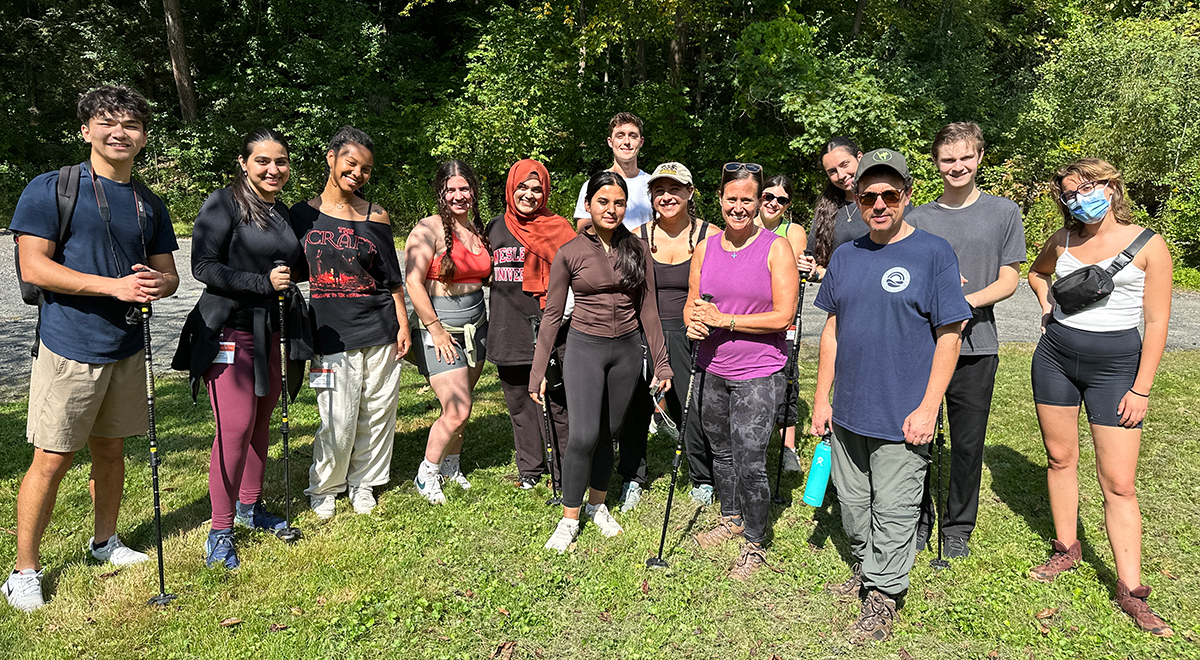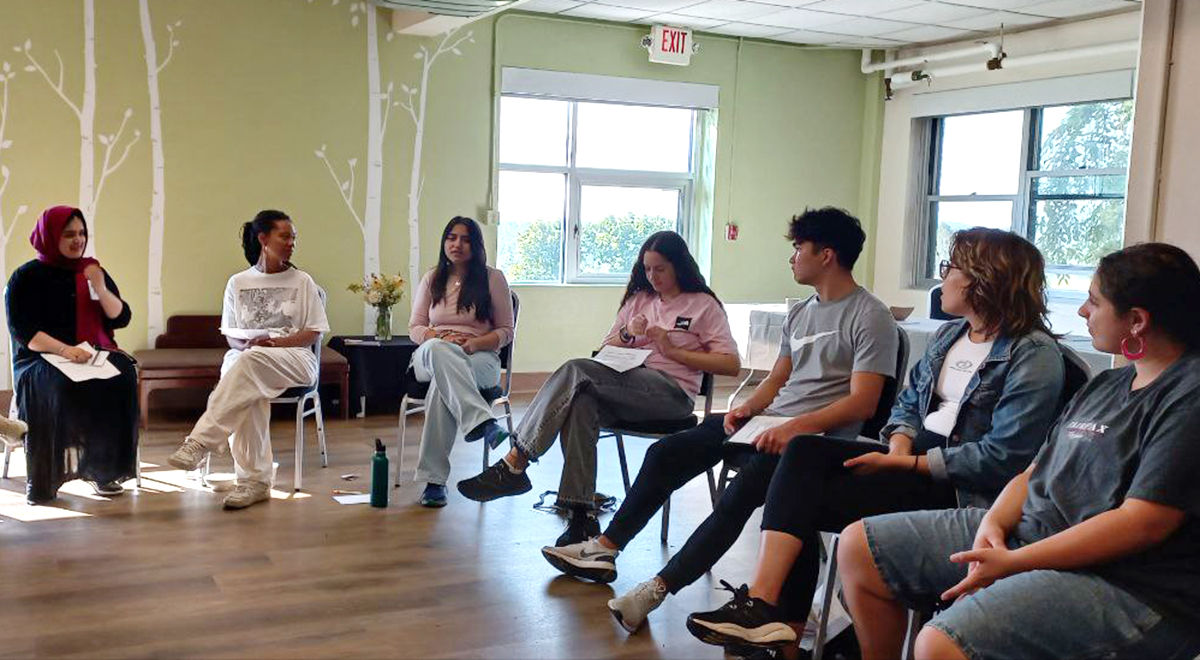Bridging Differences Through Interfaith Community and Dialogue

For three days in mid-September, the Office of Religious and Spiritual Life (ORSL) embarked on an unusual trip. The university’s three chaplains—representing Jewish, Christian, and Muslim faith traditions—took a dozen students from Wesleyan’s Mega Interfaith Leadership Council (MILC) to Kripalu Center for Yoga and Health in Stockbridge, Mass. Over the course of the long weekend, the group engaged in interfaith conversation, introspection, and community.
Between moments of silence, guided hikes, and presentations on topics like spirituality, leadership, and resilience, the spiritually diverse group connected with each other across what can seem like vast, even intractable, differences.
“We’re at the beginning of a journey with them,” said Assistant Director of the Office of Religious and Spiritual Life Shaykh Jamir D. Meah, about the dozen students who attended. The retreat “was the beginning of setting the tone for the programs and conversations that are planned for the year.”
As a first step in that journey, the Interfaith Retreat was designed to build “a spiritual community out of many spiritual communities,” Meah said. In the quiet retreat space nearly two hours from campus, the students—who identified as either Christian, Jewish, Muslim, or unaffiliated—had the opportunity to establish a level of comfort and trust with each other.
“On this campus, like many other college campuses, it’s not easy talking about your faith and your identity, or matters around God and transcendency,” said Meah. “We really wanted students to feel comfortable within themselves, and with each other, to do that.”
A second objective was learning and dialogue. Students shared their beliefs, daily practices, and rituals with each other, and what their traditions have in common as well as how they differ. Meah described that dialogue as an example of building interfaith literacy through learning.
The third aim was to expand from community building and interfaith literacy to broader community engagement. “Dialogue is essential,” said Meah, “but dialogue should ideally translate into action—it’s about putting beliefs, values, and community into meaningful action and driving positive change.”
Such faith in action could take the form of students organizing to help communities affected by recent natural and human-caused disasters in North Carolina and Atlanta. Or it could involve volunteer work closer to campus in local food shelters or cleaning up the Connecticut River, Meah said.

Assistant Director of the Office of Religious and Spiritual Life and Christian Chaplain Rev. Tracy Mehr-Muska was inspired by the relationships the students formed after the formal program sessions ended. One evening, students went stargazing together, and one morning they woke before dawn and hiked to an overlook to watch the sunrise. “You might think that after the organized programming, students might return to their pre-existing friend groups,” she said. “But they stayed engaged with each other in meaningful ways and the rich conversations continued.”
“The most memorable moments for me were the unscripted conversations I had with people from various faith backgrounds,” said Nadia Alam ’27, a student participant. “We shared honest discussions on concepts of morality, purpose, and life principles that are rarely explored on campus, whether formally or informally. I especially appreciated the opportunity to speak openly about my own faith, Islam, sharing insights about how it provides structured guidelines for relationships and personal conduct—something that’s both nuanced and often overlooked.”
After they returned to campus, Catholic and Protestant student participants planned to attend Muslim Friday prayer service or Juma. “They not only wanted to learn more, they wanted to personally experience it,” Meah said.
These interfaith experiences contribute to the university goal of creating opportunities to dialogue about difference, said Rabbi David Teva, director of the Office of Religious and Spiritual Life. “On our campus, diversity is often identity based, and that’s racial and socioeconomic. But this interreligious, multi-faith work is another dimension that’s really exciting, about people that have a sense of faith or religious identities, that share something in common, even though they are incredibly different.”
Teva also sees the ORSL’s interfaith efforts as a way to help students find belonging on campus. “In this post-pandemic environment, students are looking to meet people, and many students don’t know how,” Teva said. “That is part of this residential liberal arts Wesleyan education that’s fairly unique.”
In addition to the retreat, the chaplains are promoting interfaith dialogue and community through a class called Spiritual Autobiography: Building Communities Through Interfaith Literacy. In the course, students explore their identities and spiritual development individually and collectively, said Mehr-Muska.
The ORSL is also organizing a post-election panel discussion featuring students, faculty, and chaplains on November 12. This event will explore questions related to the election and how to find personal meaning and purpose in light of the election results. Student interns who are part of MILC will help develop questions for panelists.
Combined, all this interfaith engagement can impact student culture on and off campus. “I believe that building trust and confidence at that small community level can then ripple and have a bigger effect,” said Meah. “That’s the hope. We are trying to help Wesleyan students further develop the tools to connect with others and enter into constructive dialogue at Wesleyan and beyond to make positive contributions to communities.”
“Going forward, I’m carrying this experience with me by fostering openness and intentionality in the conversations I engage in and the spaces I create around me,” said Alam.
The retreat and continued programming are supported by grants from Templeton Religion Trust and Arthur Vining Davis Foundations.

